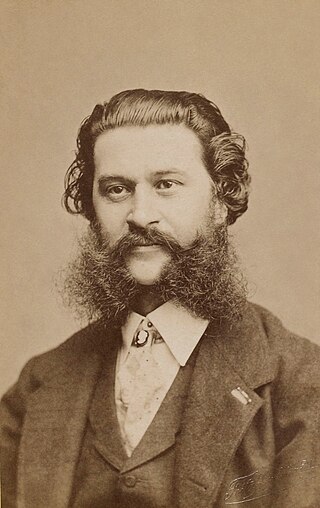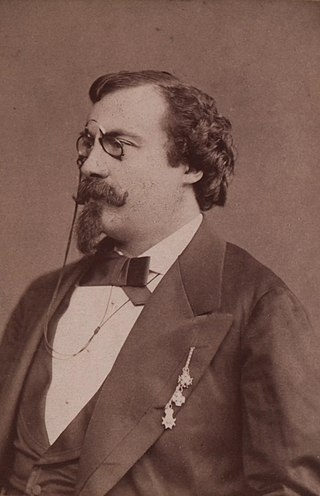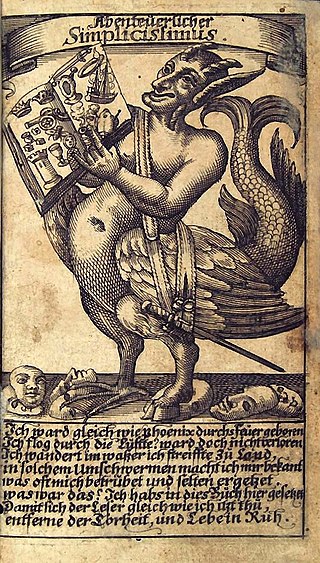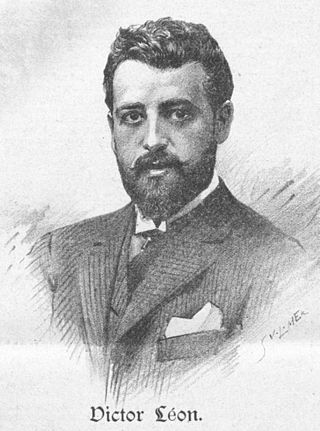
Die Fledermaus is an operetta composed by Johann Strauss II to a German libretto by Karl Haffner and Richard Genée, which premiered in 1874.

Johann Baptist Strauss II, also known as Johann Strauss Jr., the Younger or the Son, was an Austrian composer of light music, particularly dance music and operettas as well as a violinist. He composed over 500 waltzes, polkas, quadrilles, and other types of dance music, as well as several operettas and a ballet. In his lifetime, he was known as "The Waltz King", and was largely responsible for the popularity of the waltz in Vienna during the 19th century. Some of Johann Strauss's most famous works include "The Blue Danube", "Kaiser-Walzer", "Tales from the Vienna Woods", "Frühlingsstimmen", and the "Tritsch-Tratsch-Polka". Among his operettas, Die Fledermaus and Der Zigeunerbaron are the best known.

Maximilian Steiner was an Austrian actor and theater director and manager. He is known particularly for his leadership of Vienna's Theater an der Wien from 1869 to 1880, a period during which the theater reduced the importance of folk plays and was prominent in developing and promoting the fashion of a Viennese style of operetta. He was the grandfather of Max Steiner.

Franz Lehár was an Austro-Hungarian composer. He is mainly known for his operettas, of which the most successful and best known is The Merry Widow.
Hildegard is a female name derived from the Old High German hild and gard, and means 'battle enclosure'. Variant spellings include: Hildegarde; the Polish, Portuguese, Slovene and Spanish Hildegarda; the Italian Ildegarda; the Hungarian Hildegárd; and the ancient German Hildegardis.

The Merry Widow is an operetta by the Austro-Hungarian composer Franz Lehár. The librettists, Viktor Léon and Leo Stein, based the story – concerning a rich widow, and her countrymen's attempt to keep her money in the principality by finding her the right husband – on an 1861 comedy play, L'attaché d'ambassade by Henri Meilhac.

Gräfin Mariza is an operetta in three acts composed by Hungarian composer Emmerich Kálmán, with a German libretto by Julius Brammer and Alfred Grünwald. It premiered in Vienna on 28 February 1924 at the Theater an der Wien.

Marinka is an operetta by Hungarian composer Emmerich Kálmán with book by George Marion, Jr. and Karl Farkas, and lyrics by George Marion, Jr. The operetta is a retelling of the story of the Mayerling Incident, but with a happy ending replacing the infamous 1889 double suicide of Austrian Crown Prince Rudolf and his mistress, Maria Vetsera. The best-known songs include "Only One Touch of Vienna," "Sigh by Night," "The Cab Song," and "When I Auditioned for the Harem of the Shah".

"Rosen aus dem Süden", Op. 388, is a waltz medley composed by Johann Strauss II in 1880 with its themes drawn from the operetta Das Spitzentuch der Königin. Strauss dedicated the waltz to King Umberto I of Italy.

The Gypsy Baron is an operetta in three acts by Johann Strauss II which premiered at the Theater an der Wien on 24 October 1885. Its German libretto by Ignaz Schnitzer is based on the unpublished 1883 story Saffi by Mór Jókai. Jokai later published a novel A cigánybáró in 1885 using an expanded version of this same story.

Hans Jakob Christoffel von Grimmelshausen was a German author. He is best known for his 1669 picaresque novel Simplicius Simplicissimus and the accompanying Simplician Scriptures series.

Waltzes from Vienna is a 1934 British biographical film directed by Alfred Hitchcock, sometimes known as Strauss' Great Waltz. It was part of the cycle of operetta films made in Britain during the 1930s.

Robert Elisabeth Stolz was an Austrian songwriter and conductor as well as a composer of operettas and film music.

Simplicius Simplicissimus is a picaresque novel of the lower Baroque style, written in five books by German author Hans Jakob Christoffel von Grimmelshausen published in 1668, with the sequel Continuatio appearing in 1669. Inspired by the events and horrors of the Thirty Years' War which devastated Germany from 1618 to 1648, it is regarded as the first adventure novel in the German language and the first German novel masterpiece.

Der Graf von Luxemburg is an operetta in three acts by Franz Lehár to a German libretto by Alfred Willner, Robert Bodanzky, and Leo Stein. A Viennese take on bohemian life in Paris at the beginning of the 20th century, the story revolves around an impoverished aristocrat and a glamorous opera singer who have entered into a sham marriage without ever seeing each other and later fall in love at first sight, unaware that they are already husband and wife.

Victor Léon, also Viktor Léon was a well-known Jewish librettist. He collaborated with Leo Stein to produce the libretto of Franz Lehár's romantic operetta The Merry Widow.

Paul Hörbiger was an Austrian theatre and film actor.

Alfred Jerger was an Austrian operatic bass-baritone, who began his career as a conductor of operettas, and was also an interim director of the Vienna State Opera and a professor of the Vienna Music Academy. He appeared at the Salzburg Festival from 1922 to 1959, and created the leading role of Mandryka in Arabella by Richard Strauss, among others.

Josef Ichhäuser (1852–1920), known by the stage name Josef Josephi (also spelled Joseffy), was an Austrian Empire-born singer (tenor-baritone) and actor.
The Strauss Dynasty is an Austrian biographical film in six parts from 1991. It depicts the careers of Johann Strauss (father), the composer of the Radetzky March, and his son Johann Strauss (son) ("Schani"), the composer of the waltz The Blue Danube, who, despite his father's resistance, also became a musician and competed with his father as a waltz composer.















